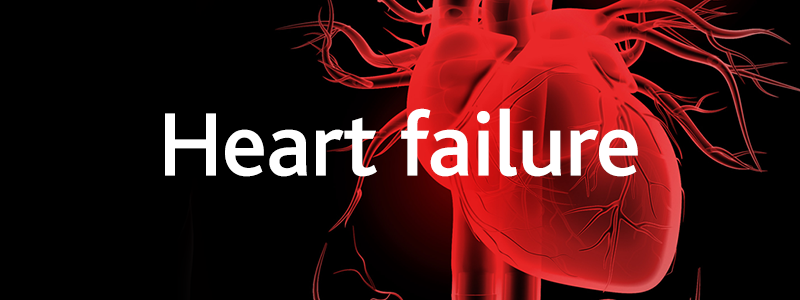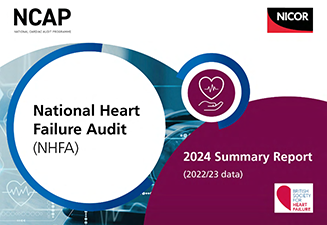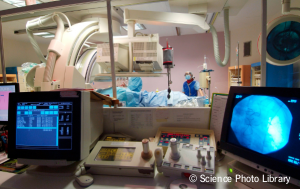Heart failure
Sponsorship Statement:
Novartis Pharmaceuticals UK Ltd has provided OmniaMed Communications Ltd with an arm’s length sponsorsip towards the update of the BJC e-learning programme for heart failure. Novartis has had no input into the content for the programme.

Heart failure prevalence is high and rising, due not only to the increasing age of the population but also from general improvements in healthcare and use of better medicines. Patients with heart failure have a poor quality of life and reduced life expectancy.
It has a profound impact on the lives of patients and carers. It is a costly condition to diagnose and manage, representing 1–2% of total NHS expenditure. Recently, there has been an expansion of the armamentarium to tackle heart failure across the spectrum of ejection fractions.
To help you get up-to-date in this important area, BJC Learning has revised its comprehensive modular e-learning programme with the latest studies and guidance covering all aspects of this growing problem. It has been independently written by leading UK physicians and endorsed by the British Society for Heart Failure.
Each module has a series of multiple-choice questions. Its ~10 hours of learning will lead to ~10 continuing professional development (CPD) credits.
The BJC Heart failure learning modules are best viewed on a desktop/laptop computer.
Faculty
Dr Joe Cuthbert, Honorary Consultant Cardiologist, Hull University Teaching Hospitals NHS Trust; Senior Lecturer in Cardiology, Hull York Medical School.
In association with Professor Andrew Clark, Chair in Clinical Cardiology, Hull York Medical School
Original modular programme
Programme supervisor/contributor:
Professor Andrew Clark, Chair in Clinical Cardiology, Hull York Medical School
Contributors:
Professor Martin Cowie, Consultant Cardiologist, Royal Brompton Hospital, London
Dr Amy Gadoud, NIHR Clinical Lecturer in Palliative Medicine, Hull York Medical School
Dr Kaushik Guha, Clinical Cardiology Research Fellow, Royal Brompton Hospital, London
Dr Carl Hayward, Clinical Research Fellow, Royal Brompton Hospital, London
Professor Miriam Johnson, Professor of Palliative Medicine, Hull York Medical School
Dr Paul Kalra, Consultant Cardiologist, Portsmouth Hospitals NHS Trust
Dr Alexander Lyon, Consultant Cardiologist, Royal Brompton Hospital, London
Dr Muhammad Muzaffar Mahmood, James Cook University Hospital, Middlesbrough
Professor Theresa McDonagh, Consultant Cardiologist, King’s College Hospital, London
Dr Andrew Morley-Smith, Clinical Research Fellow, Royal Brompton Hospital, London
Professor John Pepper, Consultant Cardiac Surgeon, Royal Brompton Hospital, London
Dr Thanh Trung Phan, James Cook University Hospital, Middlesbrough
Dr Sue Piper, King’s College Hospital, London
Dr Jill Riley, Honorary Lecturer, National Heart and Lung Institute, Imperial College, London
Dr Henry Savage, Specialist Registrar in Cardiology, Royal Brompton Hospital, London
Dr Benoy Shah, Research Fellow in Cardiology, Royal Brompton Hospital, London
Dr Rakesh Sharma, Consultant Cardiologist, Royal Brompton Hospital, London
Dr Andrew Turley, Consultant Cardiologist, South Tees Hospitals NHS Trust
Dr Ali Vazir, Consultant Cardiologist, Royal Brompton Hospital, London
Dr Donah Zachariah, Specialist Registrar in Cardiology, Portsmouth Hospitals NHS Trust
Modules revised in 2017, 2020 and 2024 by Dr Joe Cuthbert, in association with Professor Andrew Clark
Heart failure learning module 1: background, epidemiology, aetiology and pathophysiology
Released 24 May 2024 Programme: Heart failure 1.5 CPD/CME credits

- The epidemiology of heart failure
- The burden of heart failure including its cost and findings from the National Heart Failure Audit
- The aetiology, precipitants and comorbidities of heart failure
- The various classifications of heart failure
- The syndromes and pathophysiology of heart failure
Heart failure learning module 2: diagnosis
Released 24 May 2024 Programme: Heart failure 2 CPD/CME credits

- Differentiate the symptoms and signs of heart failure
- Assess symptom severity
- Discern the differences in acute and chronic presentations of heart failure
- Approach the diagnosis of heart failure according to the latest guidelines, with specific focus on natriuretic peptide testing and echocardiography
- Understand the use of objective measures of functional and exercise capacity testing
- Understand the indications for imaging and interpret the findings in the context of the individual patient
- Develop an approach to the investigation of both acute and chronic presentations of heart failure and determine the aetiology or precipitant thereof
- Differentiate between the different types of heart failure, especially according to ejection fraction
Heart failure learning module 3: lifestyle modifications and pharmacological treatment of heart failure
Released 24 May 2024 Programme: Heart failure 2 CPD/CME credits

- Understand the aims of heart failure (HF) treatment
- Recognise the role of the primary care team in HF management
- Recognise the role of lifestyle modifications (weight control, smoking cessation, exercise)
- Understand the treatment options available for acute and chronic HF
- Understand the modes of action of the different therapeutic agents prescribed
Heart failure learning module 4: invasive treatment of heart failure
Released 24 May 2024 Programme: Heart failure 1.5 CPD/CME credits

- Cardiac resynchronisation therapy – how it works and which patients are suitable for this treatment
- Other device therapies including implantable cardiac defibrillators
- The concept of sleep-disordered breathing (SDB) in heart failure and its treatment
- The role of ultrafiltration in patients with decompensated heart failure, patient selection, and the potential benefits and complications of the procedure
- The basics of gene therapy, its potential targets, clinical experience, and vectors and delivery systems
Heart failure module 5: surgical management and palliative care of HF
Released 24 May 2024 Programme: Heart failure 2 CPD/CME credits

- The basics of left ventricular assist devices
- Selection procedures for cardiac transplantation
- Long-term management post-transplant
- Revascularisation, surgical ventricular restoration and valve surgery
- What is meant by palliative care for patients with heart failure
- How to overcome recognised barriers to a palliative approach to care for patients with heart failure
- The principles of symptom control in patients with heart failure
Heart failure module 6: commonly encountered complications in HF
Released 24 May 2024 Programme: Heart failure 1.5 CPD/CME credits

- The clinical significance of common electrolyte abnormalities in heart failure
- The emergency and long-term treatment options for hyperkalaemia
- Renal dysfunction in patients with heart failure
- The treatment of anaemia in patients with heart failure.
